How to Integrate Square with QuickBooks Online using PayTraQer?
November 11, 2025
Connect Square to QuickBooks Online with SaasAnt PayTraQer
Use this guide to install PayTraQer, connect Square, choose how data posts, set your sync rules, pull history, and turn on auto sync.
What you need
Access to install apps in your QuickBooks Online company
A Square account you can authorize
If you are not the admin, be ready to use the Invite admin/client linkSteps for Integrating QuickBooks Online and Square
1) Install PayTraQer from QuickBooks
In QuickBooks Online, open Apps.
Search PayTraQer.
Select SaasAnt PayTraQer and click Get app now.
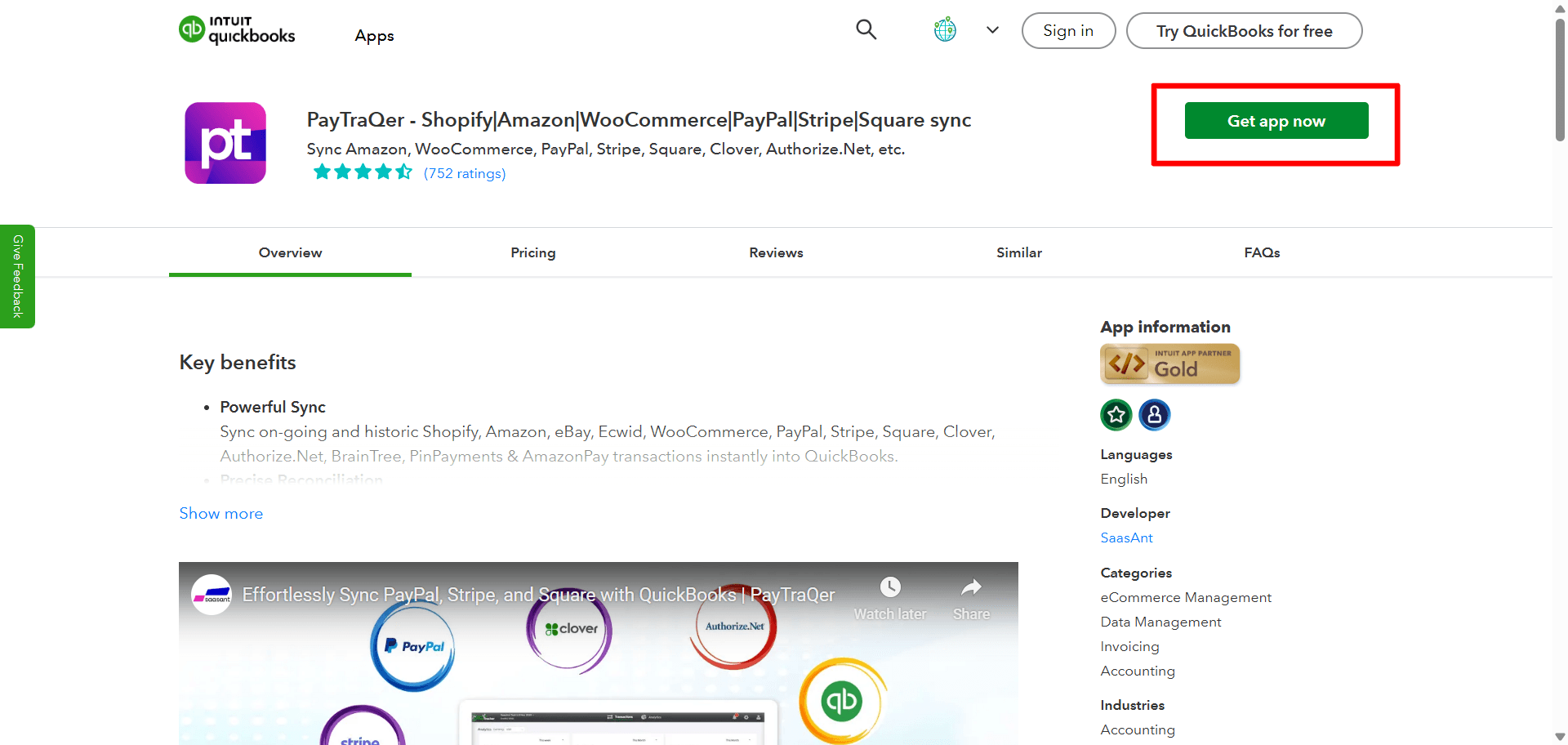
Complete the on-screen steps and Authorize access to your QuickBooks company.
2) Pick your Sync Mode
Right after connecting to QuickBooks, PayTraQer asks how to post your Square data.

Consolidated Sync (Sales Summary): fewer entries and faster reconciliation
Itemized Sync (Individual): customer and item detail in QuickBooks
Choose one and click Get Started. You can change this later in settings.
3) Connect Square in PayTraQer
In PayTraQer, go to Connectors.
Open Payment connectors.
Select Square and click Connect.
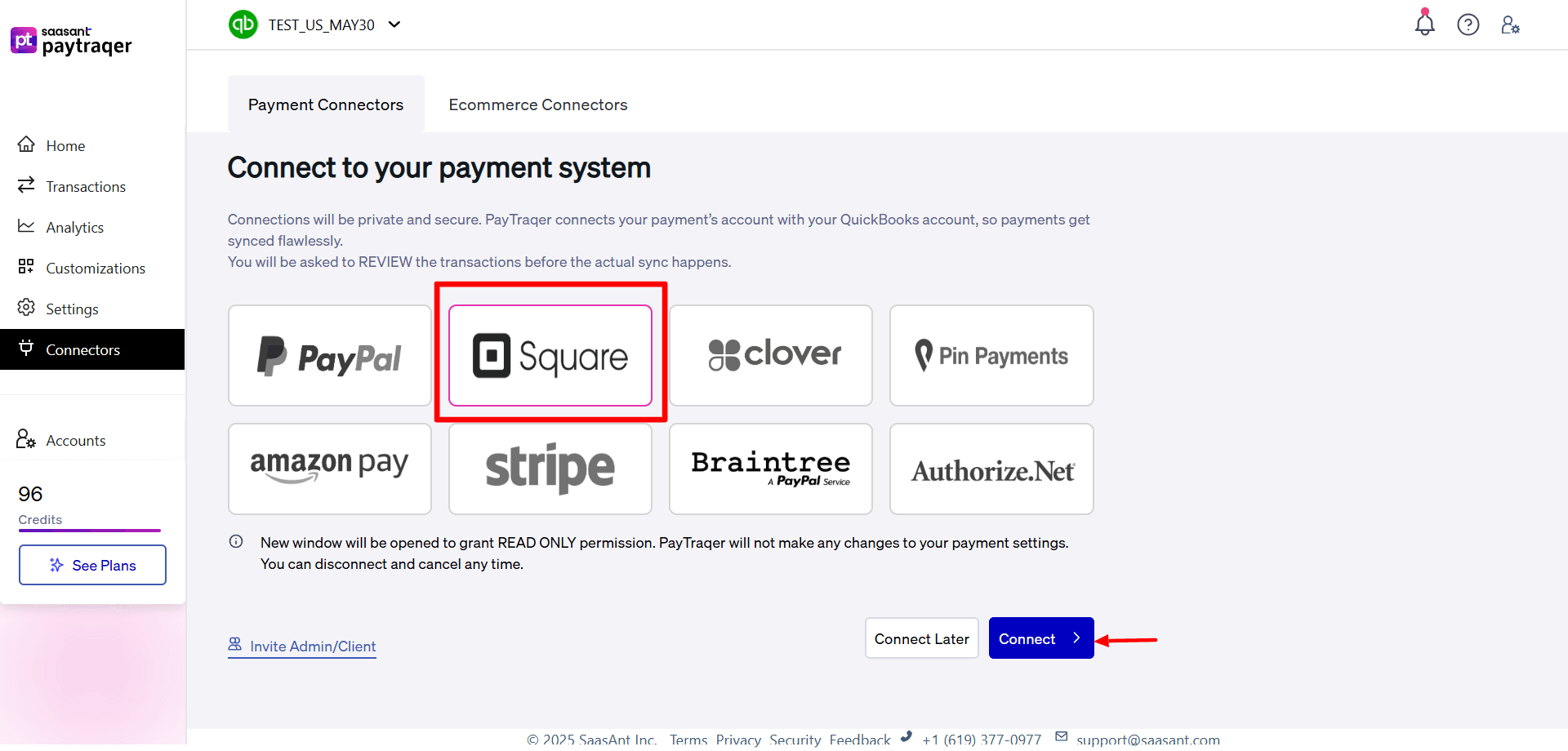
Sign in to Square and approve access. If asked, pick the Square location.
If you are not the admin, use Invite admin/client to send the auth link.
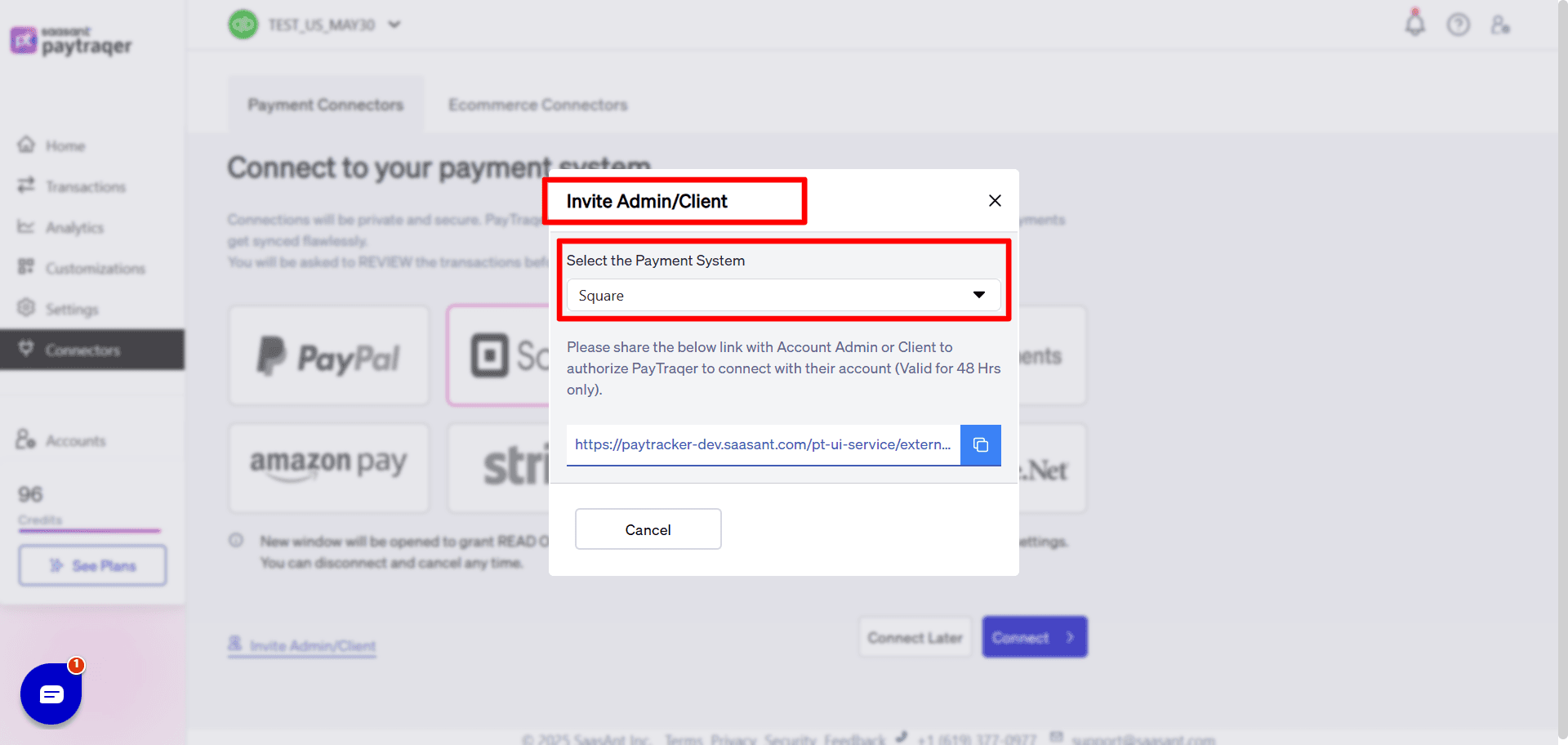
What permissions are used
From Square: read-only access to sales, fees, refunds, payouts, customers, and items
In QuickBooks Online: with your approval, PayTraQer creates and updates the records needed to stay in sync
4) First-time settings after Square approval
You are redirected back to PayTraQer to set initial options.
Fees account
Choose the QuickBooks account to record Square fees
Process payments and settlements
Toggle Do you want to process the payment/settlements
When On, select a Bank account that will act as your clearing account
Click Save
Auto download
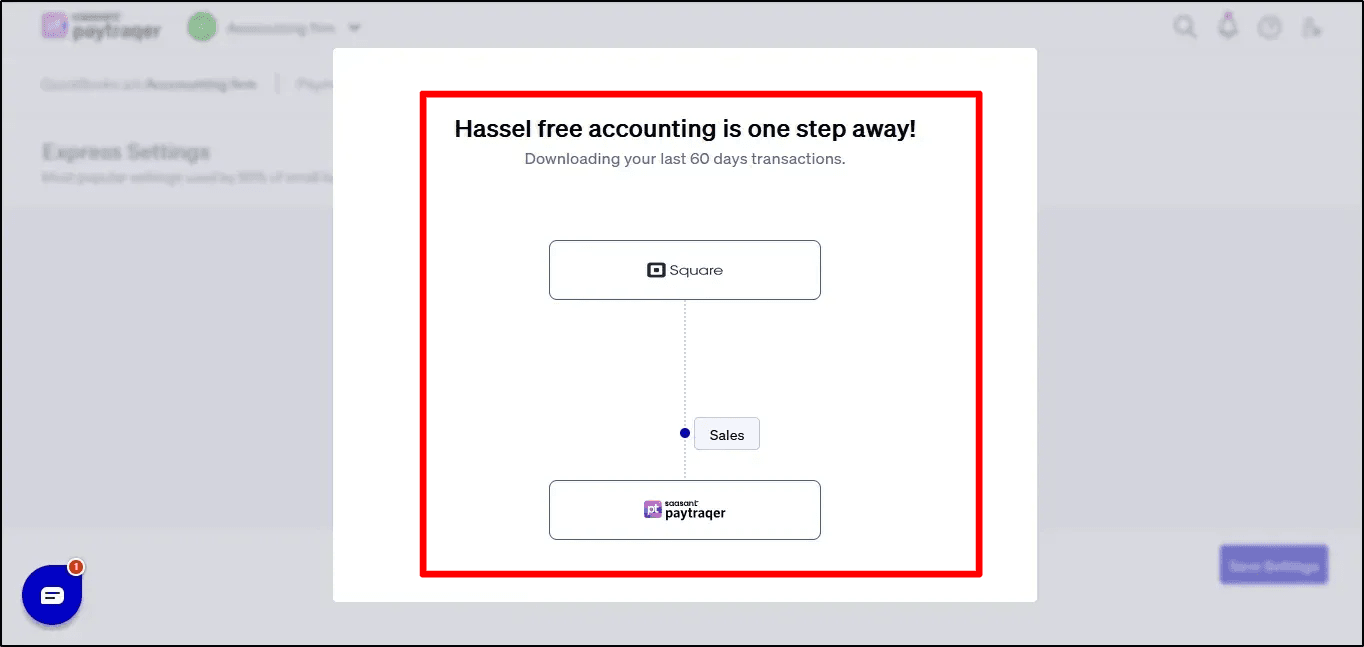
After you save, PayTraQer automatically downloads the last 60 days of Square data
More history
Use Download historical transactions to pull other date ranges with From and To filters.
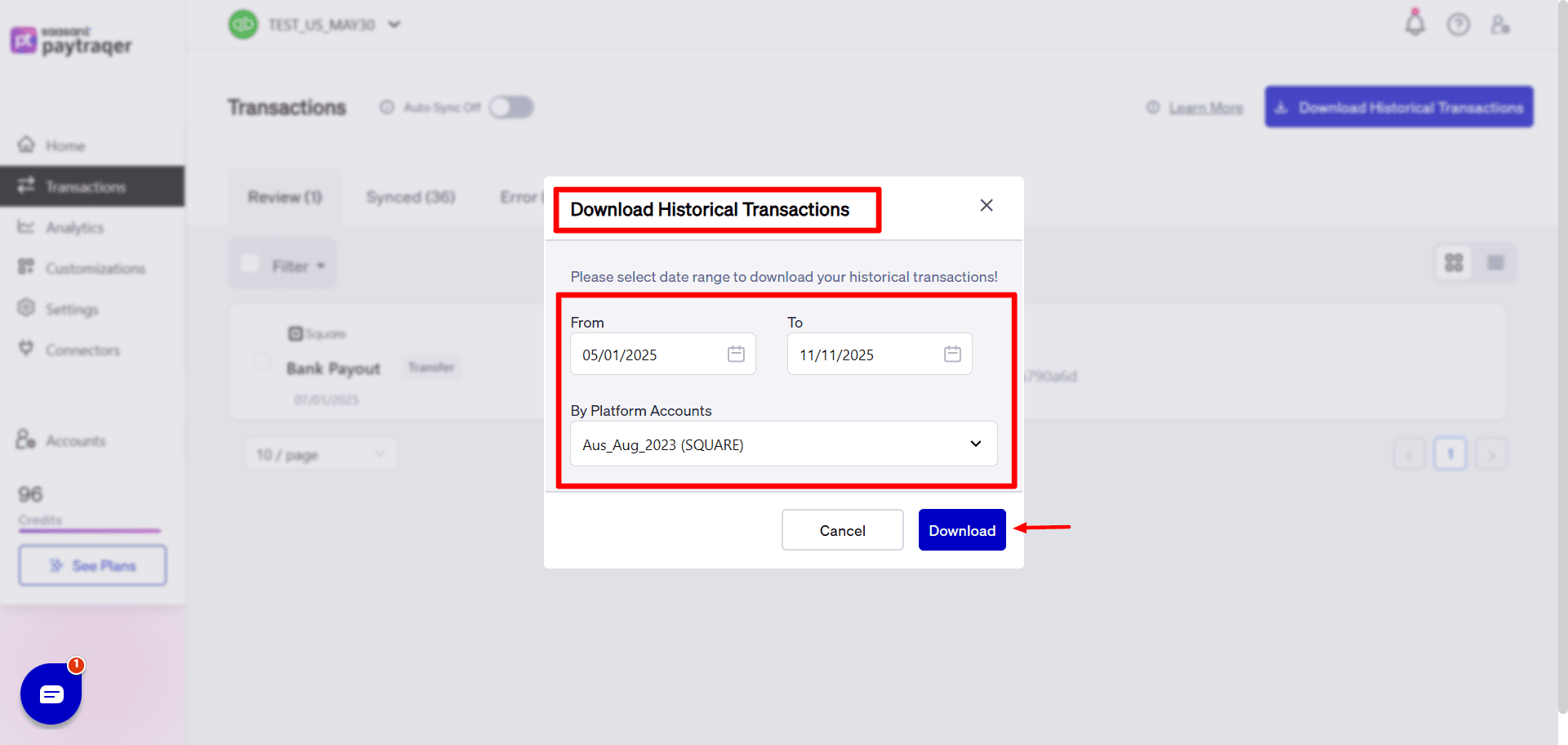
Quick note on Auto Sync
When Auto Sync is on, PayTraQer downloads and syncs new Square transactions to QuickBooks at regular intervals.
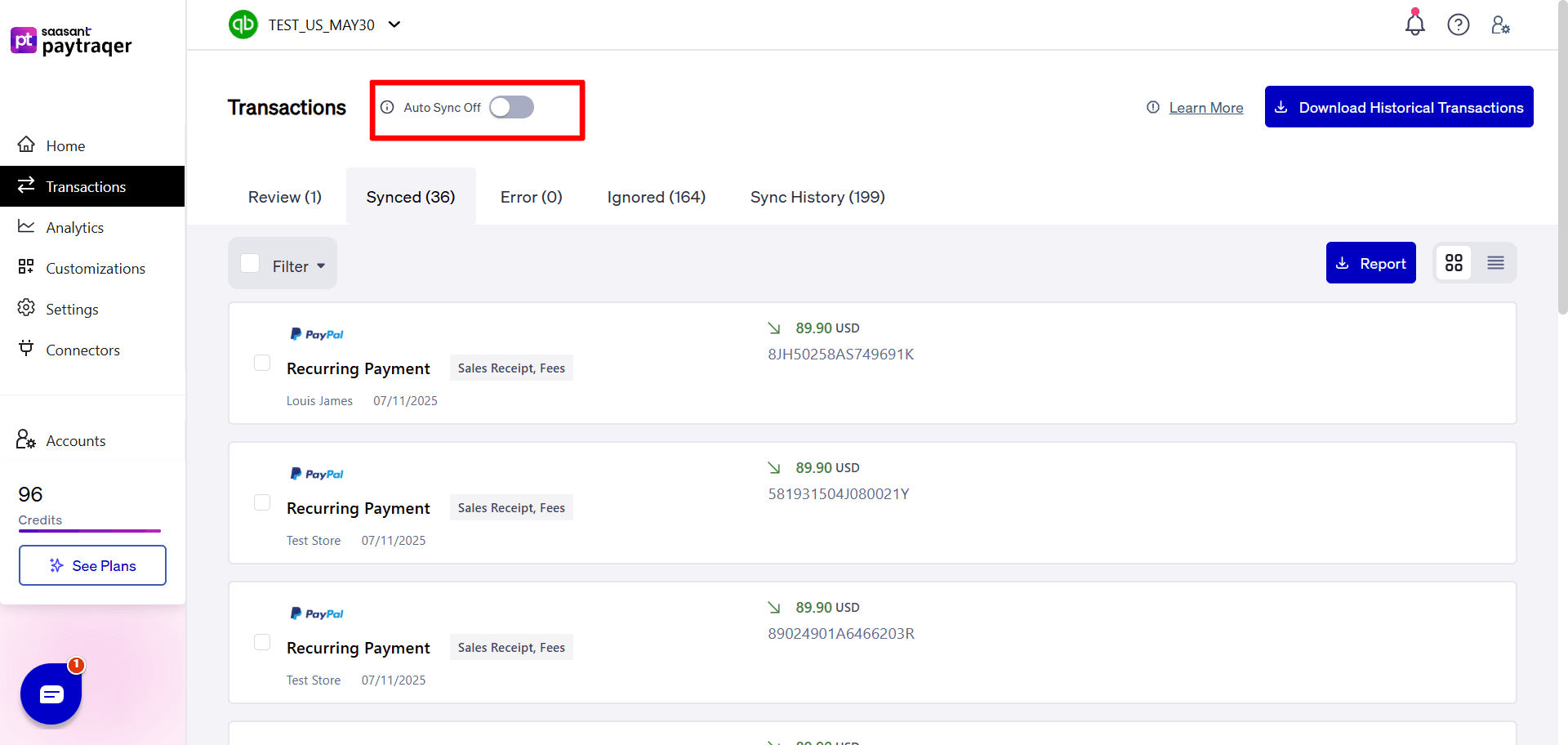
5) Sales sync settings
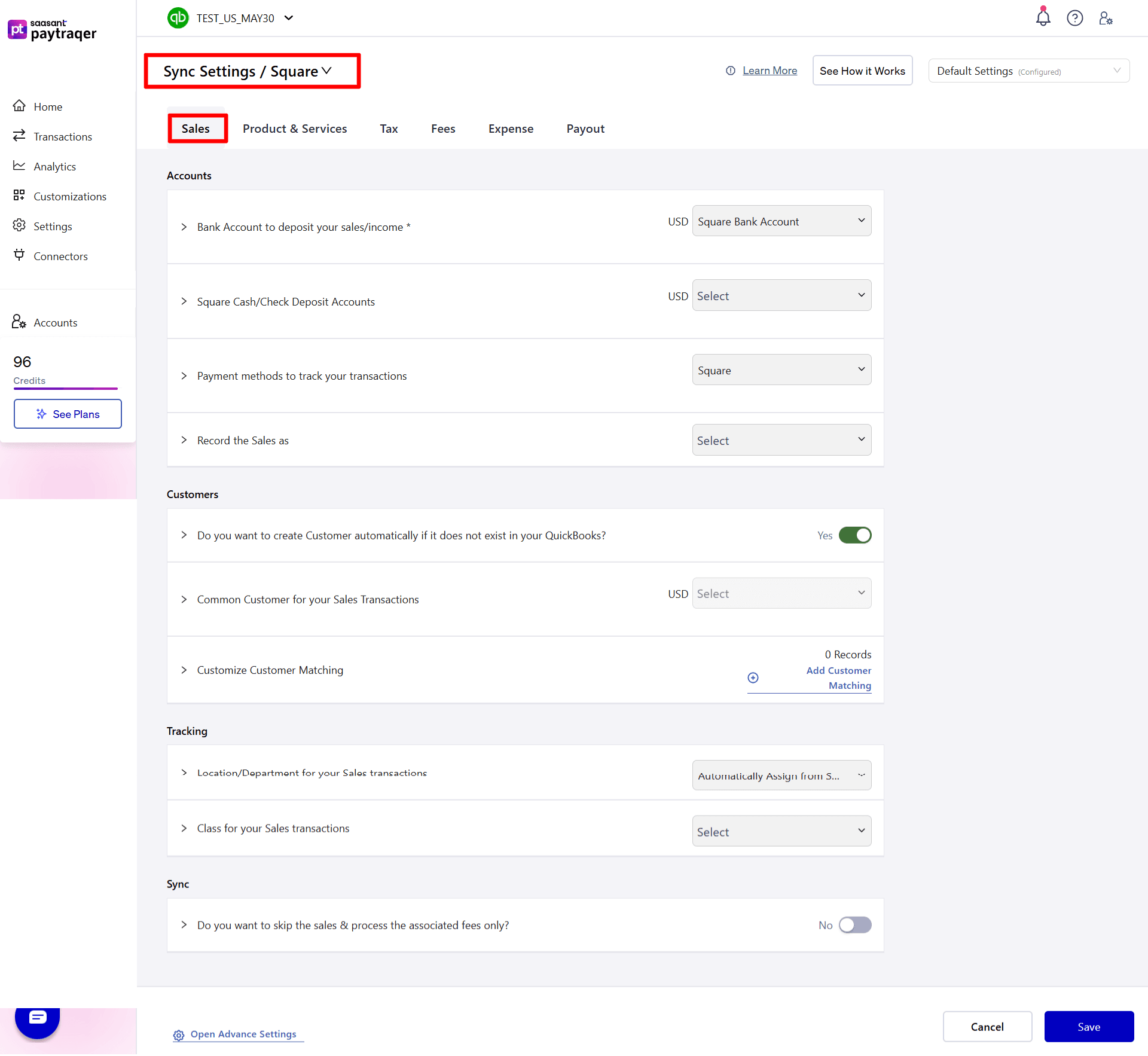
Bank accounts
Bank Account to deposit your sales/income
Select the clearing Bank account where synced sales will be recorded
If you use multi-currency, set a clearing account per currencySquare Cash/Check Deposit Accounts
Pick the bank account for Square cash or check payments
Payment methods
Payment methods to track your transactions
Choose the payment methods to set on created sales, for example Square, Cash, Card, PayPal, Stripe
How to record sales
Record the Sales as
Choose the QuickBooks sales form that fits your flow
Sales Receipts are common for POS sales. Invoices fit bill-then-pay flows
Customers
Create Customer automatically if it does not exist
Turn on to auto-create customers when no match is found by nameCommon Customer for your Sales Transactions
Use one default customer for all sales if you do not want separate customersCustomize Customer Matching
Add mapping rules from Square names to your preferred QuickBooks customer names
Tracking
Location/Department for your Sales transactions
Automatically assign from Square or pick a fixed valueClass for your Sales transactions
Set a class for all synced sales
Sync scope
Do you want to skip the sales and process the associated fees only
Turn on to post only fee expenses and skip sales details
6) Products and services settings
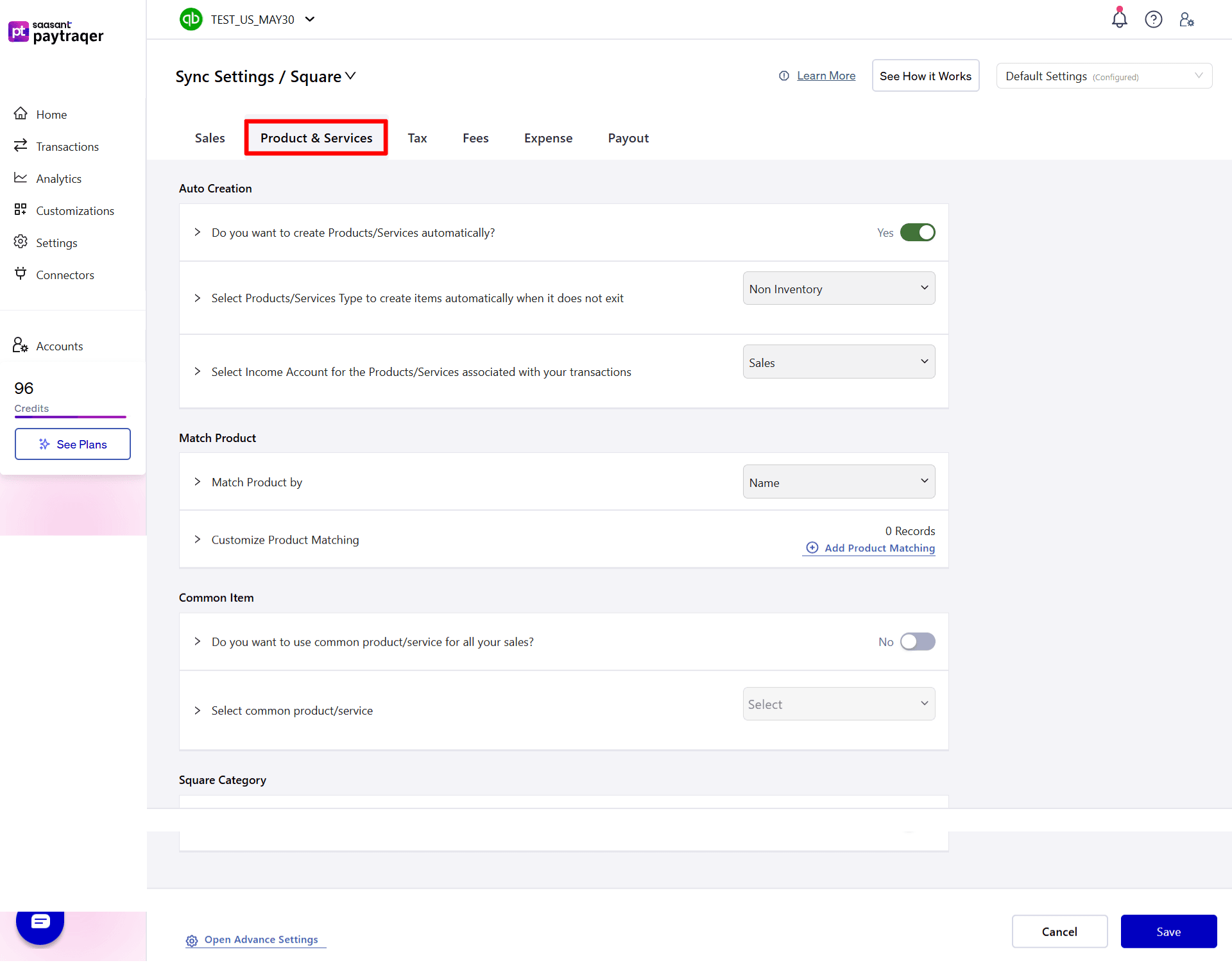
Auto-creation
Do you want to create Products/Services automatically
Turn on to auto-create an item in QuickBooks when no exact match is foundSelect Products/Services Type
Choose Non-Inventory or Service for auto-created itemsSelect Income Account
Choose the income account to link to auto-created items
Matching
Match Product by
Pick Name or SKU
Use SKU if you keep stable SKUs in both Square and QuickBooksCustomize Product Matching
Map a Square name or SKU to a specific QuickBooks product or service
Common item
Use common product/service for all your sales
Turn on to use one default item on every synced sale, then pick the item
Square Category as line item
Use Square Category as Line Item in Sales
Turn on to post each sale line using the Square Category instead of actual products
7) Tax settings
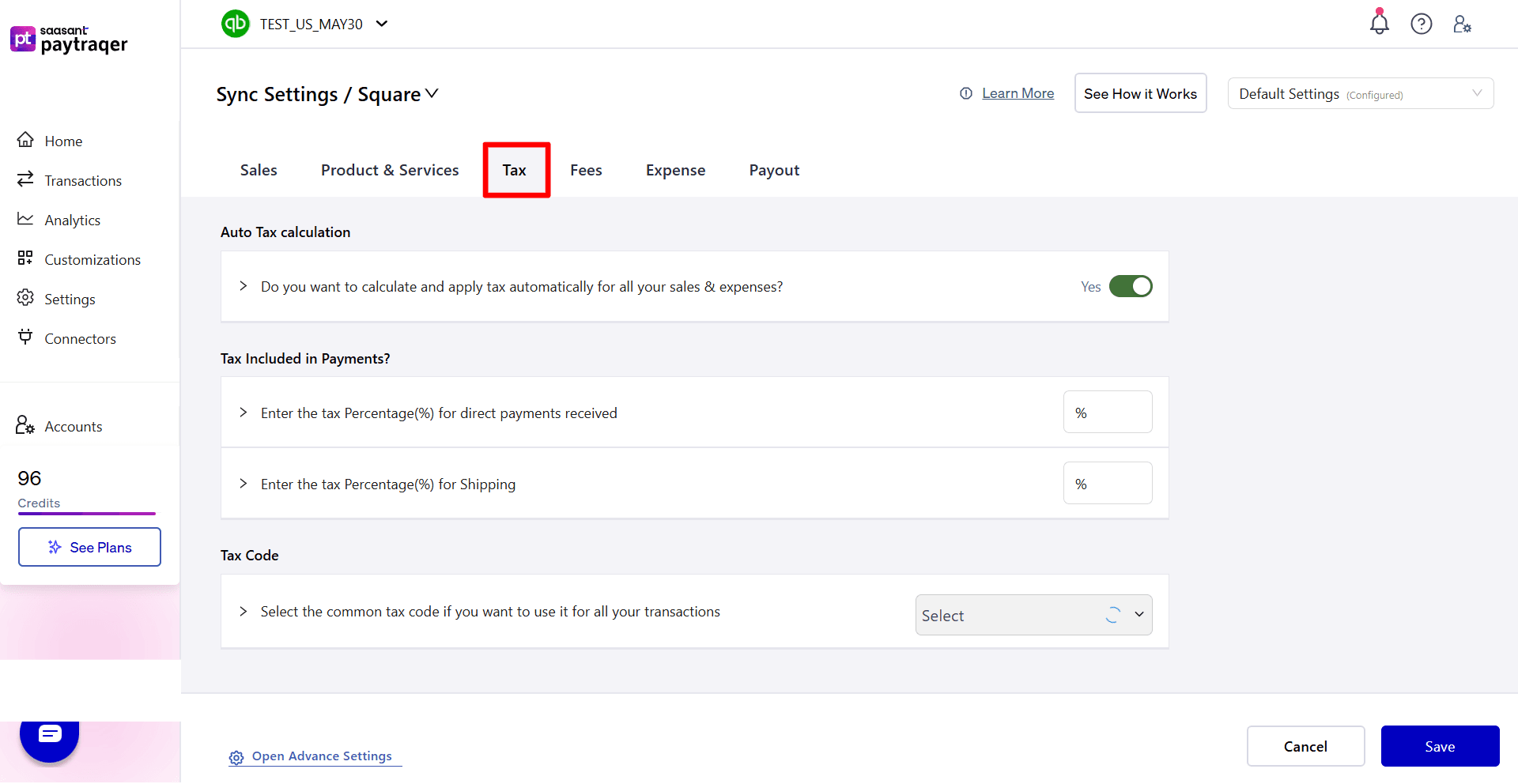
Calculate and apply tax automatically
Turn on to let PayTraQer detect and apply tax on synced sales and expensesTax included in payments
Enter the Tax Percentage for direct payments if tax is includedShipping tax percentage
Enter the tax percentage to apply on shipping amountsTax Code
Choose a default tax code for all transactions if you want a fixed code
Setting this overrides automatic tax detection
Tip: Run a short test and open a few sales in QuickBooks to confirm tax codes and amounts.
8) Fees settings

Vendor who receives the payment fees
Choose the vendor that represents SquareFee category
Pick the expense account, for example Square FeesBank Account to record Payment Fees
Choose the bank or clearing account where fee entries will postClass for your Fees
Set a class for all fee expensesLocation/Department for your Fees
Set a location or department for fee expensesSkip fee details from syncing
Turn on to exclude fee lines when syncing sales
Tip: Use the same clearing account for sales and fees to keep reconciliation simple.
9) Expense settings
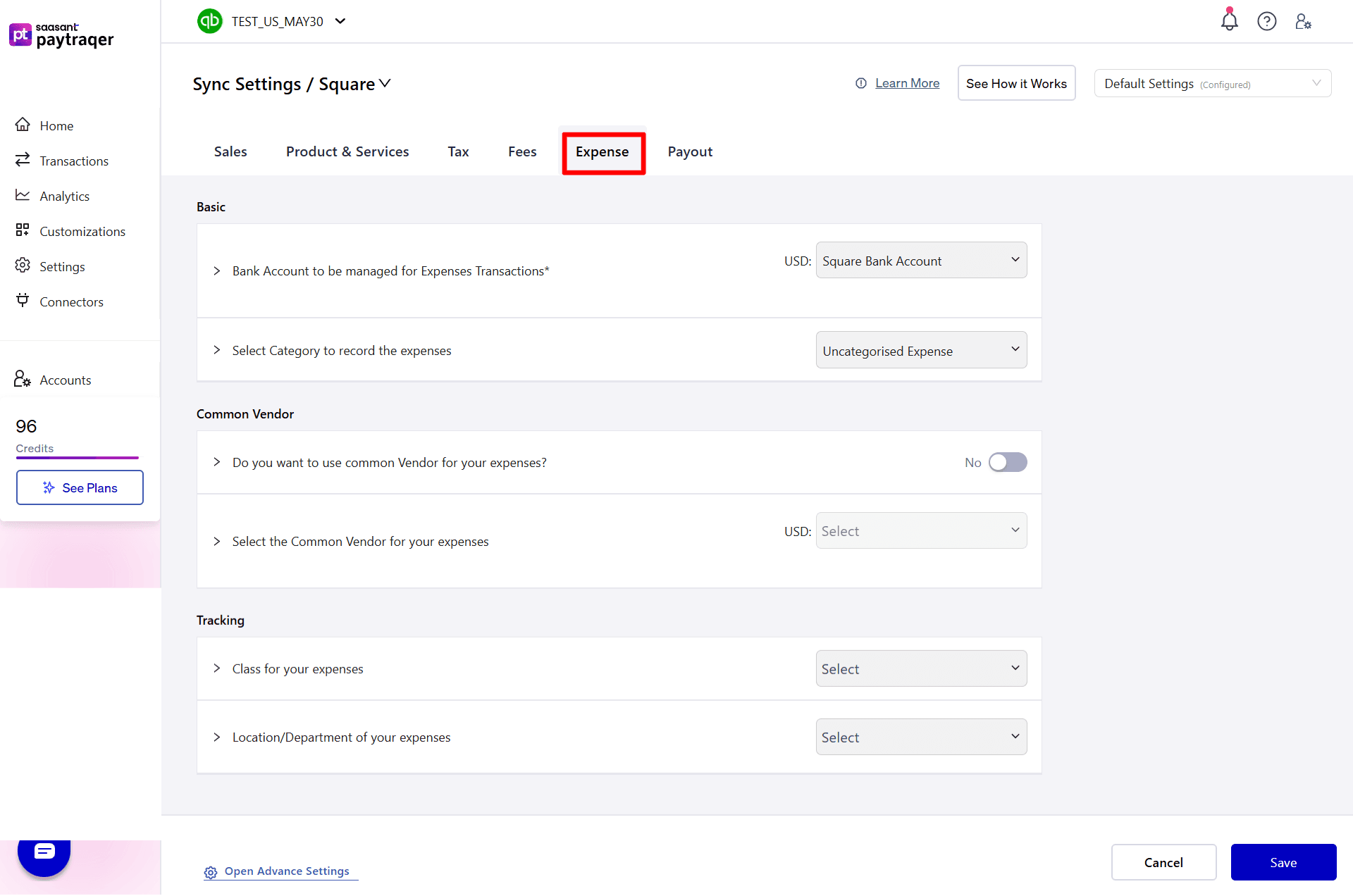
Bank Account to be managed for Expenses Transactions
Choose the bank or clearing account where expense transactions should postCategory to record the expenses
Pick the expense category, for example Uncategorised ExpenseUse common Vendor for your expenses
Turn on to apply one vendor to all expense entries, then select the vendorClass for your expenses
Set a class for all expensesLocation/Department of your expenses
Set a location or department for all expenses
10) Payouts and settlements
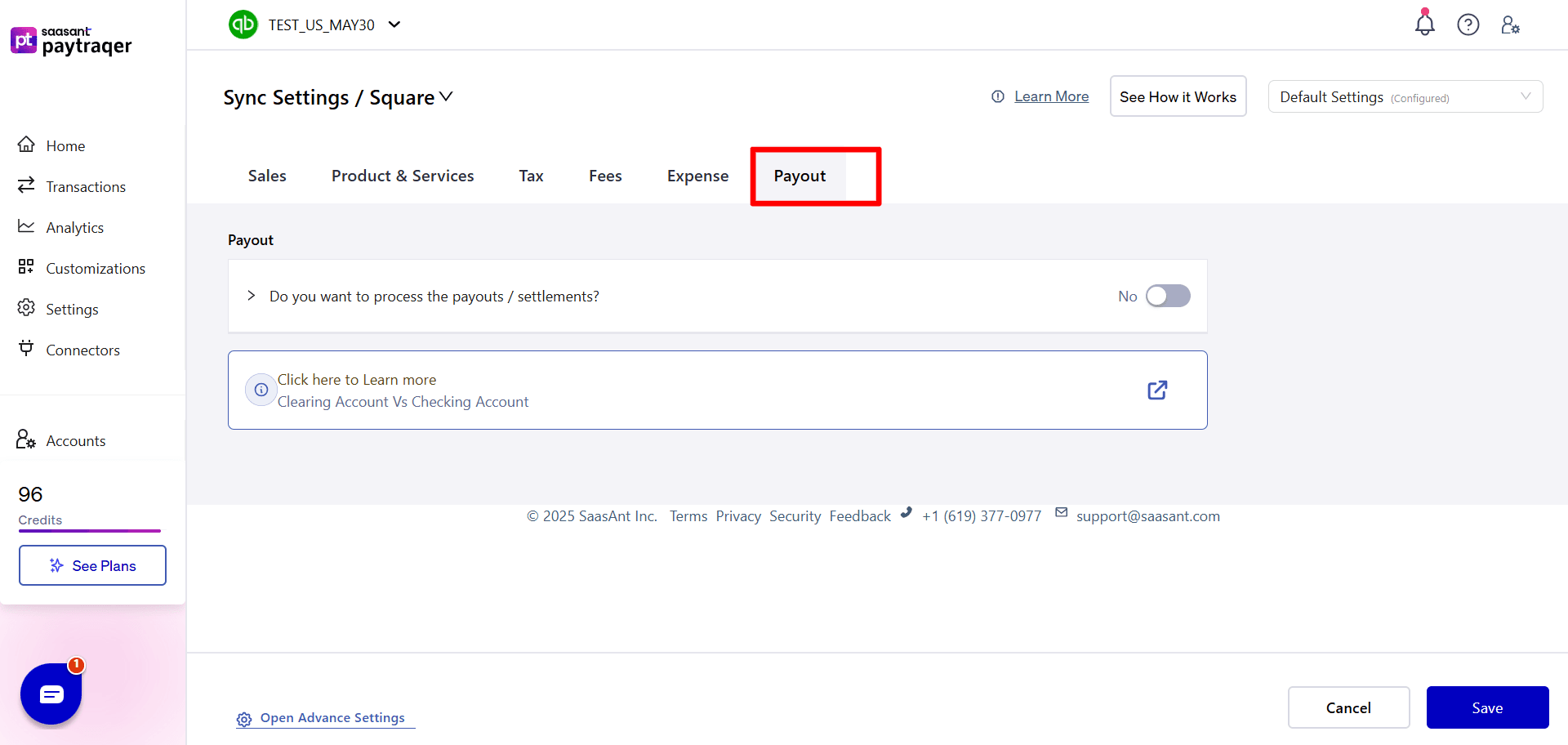
Do you want to process the payouts/settlements
Turn on to sync Square payouts as Transfer transactions in QuickBooks
PayTraQer moves money from your Square clearing bank account to your checking account
This helps QuickBooks match the deposit in your bank feed
Setup
Toggle payouts On
Select the checking account that receives Square deposits
Save
Multi-currency
Set the receiving account for each currency if you use more than one
When to keep it off
Leave it off if you record bank deposits by hand and do not want PayTraQer to create transfers